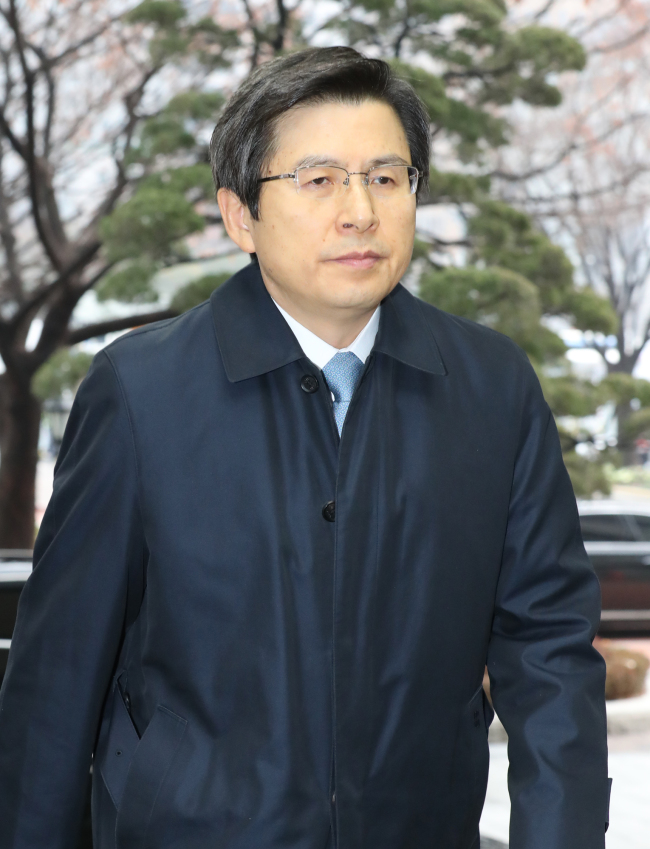Throughout his four-year career in the Park Geun-hye administration, new acting President Hwang Kyo-ahn has been a perennial source of contention.
His two confirmation hearings, first in 2013 as a justice minister nominee and then for the premiership two years later, were strewn with allegations of wrongdoing. He was accused of dodging income and gift taxes, real estate speculation and military service evasion, among other allegations, while sparking public furor over his lopsided historical, political and religious views.
While in office, the 59-year-old retired public security prosecutor won the trust of the now-disgraced president. But he clashed with opposition lawmakers, experts and other critics on nearly every hot issue, from the spy agency’s meddling in the 2012 presidential election to state-authored history schoolbooks to the dismantling of a far-left political party.
 |
Prime Minister Hwang Kyo-ahn (Yonhap) |
Against all odds, Hwang on Friday became the fifth acting president in Korean history and the third prime minister to take over the position.
Following the vote, opposition parties ratcheted up pressure on Hwang, saying he should also take responsibility for failing to nip the Choi Soon-sil scandal in the bud, despite warning signs that began to emerge since he became justice minister.
“The People’s Party has said the prime minister is unfit for the job (of acting president). So we want him to resign voluntarily,” the party’s interim chief Rep. Kim Dong-cheol told reporters, calling for opposition-wide talks on the fate of Hwang and the deputy prime minister in charge of finance.
Main opposition Democratic Party of Korea chair Rep. Choo Mi-ae has also urged Hwang and all other ministers to leave. But after the vote, she apparently shifted to a wait-and-see position, saying the focus should be on “minimizing confusion” for the time being.
But Choo raised the need to nominate a new deputy prime minister in charge of finance, saying further reviews are required for Park’s nominee Lim Jong-ryong, currently chairman of the Financial Services Commission.
“With the passage of the impeachment motion, the prime minister, who is appointed by the president, as well as the entire Cabinet in effect, obtained a vote of no confidence,” Choo said at a news conference.
“I will closely monitor whether the acting leadership will uphold the people’s desire as shown during the candlelight vigils or go against it.”
Yet ruling Saenuri Party legislators and others expressed skepticism over another leadership change, citing the difficulties of ousting the president and premier all at once and the ensuing vacuum in state governance it would create. Saenuri Party floor leader Rep. Chung Jin-suk on Friday labeled Choo an “anarchist,” saying her idea would only trigger “national anomie.”
The Constitution does not define the specific boundaries of an acting president’s authority, nor do the government’s crisis management manuals carry detailed guidelines for a presidential vacancy.
Opposition lawmakers are adamant that the power of Hwang, who is not an elected official, ought to be kept to a minimal level. This means he cannot nominate Cabinet members, Supreme Court and Constitutional Court justices or other core posts, or sign major treaties such as free trade agreements.
Two opposition legislators, Reps. Min Byung-doo of the Democratic Party of Korea and Kim Kwan-young of the People’s Party, have been pushing for a bill to enshrine the principles and clarify an acting president’s role.
The Prime Minister’s Office, meanwhile, has been preparing for a possible Hwang leadership, exploring what to prioritize among various tasks to minimize a vacuum in state management. Their review was chiefly based on the 2004 case when Goh Kun became acting president after then-President Roh Moo-hyun was impeached, officials said.
Following his takeover, Goh was seen as largely maintaining the status quo, refraining from even visiting Cheong Wa Dae or requesting its escort or other administrative support. With Roh’s duties suspended, a public-private personnel recommendation committee within the presidential office steered several vice-ministerial appointments, while scheduled overseas trips and summits were canceled.
Some level of confusion appears inescapable, however, given the absence of precedents and the quickly evolving political situation.
In the 2004 case, Roh’s duties were restored about two months after the vote, as the Constitutional Court overturned the result.
This time, the court’s deliberation may take up to six months, which in turn would prompt Hwang to exercise greater power to facilitate state affairs. With a two-month election campaign taken into account, his term could stretch to eight months in total.
In the wake of the impeachment, debate on a constitutional amendment is likely to heat up anew, which has divided not only the Saenuri Party, but even the opposition camp.
While Democratic Party presidential front-runner Moon Jae-in argues that the Assembly should focus on the election, leaving the Hwang leadership intact, the party’s former chair Sohn Hak-kyu has been calling for the party to formulate a neutral Cabinet and take the initiative in constitutional reform efforts.
By Shin Hyon-hee
(
heeshin@heraldcorp.com)




![[Weekender] Korea's traditional sauce culture gains global recognition](http://res.heraldm.com/phpwas/restmb_idxmake.php?idx=644&simg=/content/image/2024/11/21/20241121050153_0.jpg)



